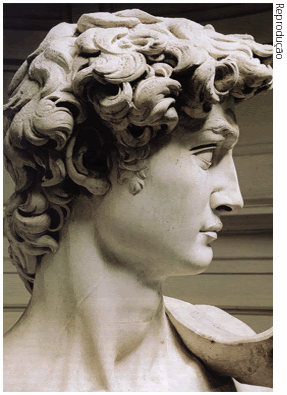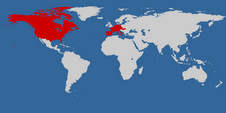quinta-feira, 31 de agosto de 2006
The Monuments, my neighbours...
Editado por RIC às 17:50 20 comentário(s)
Separadores:
Lisboa
![]()
How to use the f... word: a pragmatic approach...

1. Dismay — Oh! Fuck it.
2. Aggression — Fuck you.
3. Passive — Fuck me.
4. Command — Go fuck yourself.
5. Incompetence — He’s a fuck-up.
6. Laziness — He’s a fuck-off.
7. Ignorance — He’s a fuckin' jerk.
8. Trouble — I guess I’m fucked now.
9. Confusion — What the fuck.
10. Despair — Fucked again.
11. Philosophical — Who gives a fuck?
12. Denial — You ain't fuckin' me.
13. Rebellion — Fuck the world.
14. Annoyance — Don't fuck with me.
15. Encouragement — Keep on fuckin'.
16. Etiquette — Pass the fuckin' salt.
17. Fraud — I got fucked by my insurance agent.
18. Difficulty — I can't understand this fuckin' business.
19. Identification — Who the fuck are you?
20. Ugliness — You're a dumb looking fuck.
21. Agreement — You're fuckin' all right.
22. Benevolence — Don't do me any fuckin' favors.
This piece of linguistic jewelry was copied at Greenwich Village, NYC, NY, from a shop window (!) by RIC himself. When? Some time ago…
Yeah, I was there myself, and I was feeling terrifically well. I just couldn't either imagine – or believe – you could read something like that, inside a beautiful wooden frame on blatant display at the front of the shop window. I still remember all the noisy laughs I had while copying it…
(If I have offended you, I am sorry. However, and as a disclaimer, the first sentence of «About» reads as follows: «Here anything may become a subject».)
Editado por RIC às 05:20 9 comentário(s)
Separadores:
Linguística
![]()
quarta-feira, 30 de agosto de 2006
Time for an assessment

New world? Definitely, at least for me it is. Brave? No, I don't think so.
For the very first time in mankind's history, the whole planet is involved, at least virtually. This is the world of the 21.st century, inhabited by men and women of the 21.st century.
What was I expecting to find, to discover, that might – just might – help me change this bad opinion I have of mankind's future, which has been haunting me for the last few decades? Hard to say. All theatrical poses aside, excessive naïveté and credulity turn easily into imbecility. This seems to have been my motto for a long time now. I guess I've always wanted to believe because I know in the end I'm always sceptical. The truth is, however, I do not believe.
My intention of having a blog, though it was set off by personal, intimate reasons, has never had anything to do with wanting to watch myself in a public mirror. This is a reason that wouldn't have ever attracted me to bloggers' community. Keeping a diary is an interesting, useful activity I carried out myself for some time (years, as a matter of fact) in the privacy of my notebooks. For my eyes only. Others may have other concepts of what a diary should be, that goes without saying. I don't argue that either.
I had thought of my blog more as a place for the sharing of ideas, convictions, knowledge, wisdom, wit, sorrow, happiness, sadness, help, understanding, compassion, respect, questions, answers, quests, discoveries, findings, you name it. I'm still thinking the same of it. Too high an expectation? Don't think so either.
Whether I'm disappointed? I think I am. That I was expecting everyone would be somehow better human beings only because I was meeting them on the net? I am naïf indeed, quite often, but I'm definitely not an idiot. Exceptions to this shadowy scenery? A few, of course, rather good ones indeed, but much fewer than I was willing to admit. To my disenchantment.
Right this minute I'm having difficulties in putting in words what goes through my mind and heart, since these words aren't mine. I'm somehow borrowing them. But that's only a part of the problem, which I can cope with without blaming myself for it. I've made that choice myself quite consciously. I don't regret it at all.
You get an email, and you feel more or less uncomfortable until you've answered it. Someone out there is waiting, and you're not supposed to leave people waiting. Once answered, you feel you've done your job. And you feel well again.
You send an email and… Let's not get into poor, sad details. It's just not worth it.
It's time for me to set things right, I think. On my favourites' list there are links that will cease to exist. Being polite doesn't pay most of the time nowadays. This is a lesson I've been taught by life many times, over and over again. But I guess I never learn… Am I stupid or what? One tries to be friendly several times in a row, and what does he get in return? Olympic disregard. Yes, that's human too, I know. «L'esprit du temps» is how the French call it; the Germans call it «Zeitgeist». What I call it doesn't really matter now.
So I'm settling for the happy few. These know they're not concerned by this outburst of dismay. I believe they know now, too, I am like that: like a sleeping volcano that suddenly bursts into a huge eruption that calms down soon after.
Many thanks to all of you whom I know I have great reasons to be grateful to!
Editado por RIC às 02:10 21 comentário(s)
Separadores:
Quotidianos
![]()
terça-feira, 29 de agosto de 2006
Queda de amor

Tropecei num nome
E caí na tua vida
Perigosas as quedas
Inesperadas, impreparadas
Onde não devia
Mas queria
E a fantasia dizia
Fica, fica
Se queria, se queria
Quem diria
Tropecei em ti
E saí da tua vida
E a fantasia dizia
Não vás, fica
Se queria, se queria
Quem diria
E saí e caí
E sofri
E o teu nome
Já não estava ali
Sem fantasia fiquei
Não onde queria
Não na tua vida
Onde não devia
Nos meus olhos
Chovia, chovia
E eu sem fantasia
Esquecia, esquecia.
Editado por RIC às 20:49 2 comentário(s)
Separadores:
Ficções
![]()
The Feeling Meme
Superlatives in life are quite difficult to pinpoint. At least for me they are. Events and experiences become relative as time goes by. And the older you get the less absolute everything gets in life. Both for the better and for the worse…
I'll do my best anyway, and promise to be truthful in my answers.
1. The most joyful I have ever felt: One morning some years ago, when I woke up and was in those first moments absolutely convinced my best friends were alive, so vivid had been the dream I'd had that night.
2. The angriest I have ever felt: As we say around here I «boil in little water» (yes, my fuse is short); I get easily angry, but soon everything is back to normal.
3. The most at peace I have ever felt: When I realised for the first time that the only way my departed friends and mother would stay alive was through my remembering of the best moments I had spent with them.
4. The most shocked I have ever felt: the several times I had to go through the process of being told that my mother or my friends had passed away.
5. The most embarrassed I have ever felt: Many times, as I'm short-sighted and not the best observer in the world. So I've gone by many people I absolutely should notice and greet without seeing them at all. Important people, I should add.
6. The saddest I have ever felt: The instant I realised what a doctor had just told me some minutes before: due to the cancer's origin affecting my mother, no operation would ever save her.
7. The most frightened I have ever felt: A few times, always due to serious changes in my life of which I thought I wouldn't be able to deal with.
I got this meme from Hanuman1960, «Chai and Sympathy». Or maybe I should say «at»… No, don't be mean to me: I didn't steal it, no way! He's fully aware I'll be posting it one of these days. Not exactly when though… I'll tell him, of course.
Editado por RIC às 03:37 8 comentário(s)
Separadores:
Mêmes e Testes
![]()
segunda-feira, 28 de agosto de 2006
Ivo Pogorelich, der wundervolle Klavierspieler

Erstaunlich lange war er die perfekte Besetzung für die Rolle des genialen Künstlers: für seine Gemeinde ein Gott am Klavier, im Leben ein blasierter Dandy mit langem Haar, flatterndem Seidenschal und androgyner Aura. (Foto)
Er war metrosexuell, lange bevor es den Begriff überhaupt gab. Ein früher Beckham des Pianos, das glamouröse Gegenmodell zum vergeistigten Virtuosen der Vergangenheit. Und sogar das Spiel passte zum Image des Jünglings, der 1980 mit 22 durch einen Klavierwettbewerb berühmt wurde, den er auf spektakuläre Weise vergeigte. Pogorelichs Platten wurden Renner, seine Konzerte waren ausverkauft.
Der Kroate Ivo Pogorelich, 47, war der Popstar am Klavier, ein Künstler der Extreme. Beinahe zwanzig Jahre hielt der Pakt mit Plattenindustrie und Publikum, dann unterbrach der Tod von Pogorelichs Frau 1996 die Karriere. Der Pianist zog sich weitgehend aus dem Konzertleben zurück – das vorläufige Ende eines modernen Romantikers.
Nun ist er, äußerlich und künstlerisch verwandelt, wie ein angeschlagener Boxer zurück. Seine Haare sind geschoren, sein Gesicht ist fülliger geworden. Und sein Spiel hat alle Leichtigkeit verloren, es klingt schwer und düster. Pogorelich zerlegt die Stücke auf der Klaviatur wie ein Pathologe eine Leiche auf dem Seziertisch – mit kalter, abgeklärter Neugier.
Am 27. und 31. August tritt er beim Kunstfest Weimar mit Rachmaninows 2. und Prokofjews 3. Klavierkonzert auf. Die Junge Philharmonie Thüringen, ein Ensemble von Berufseinsteigern, begleitet, und Hans Rotman, der seine künstlerischen Meriten hauptsächlich in Erfurt und Halle sammelte, dirigiert.
Der Ausnahmekünstler scheint sich mit solchen Auftritten auch beweisen zu wollen, dass er seine private Tragödie überwunden hat. 1980, in seinem Schicksalsjahr, hatte Pogorelich, der damals als «schönster Pianist seit Franz Liszt» galt, seine Klavierlehrerin, die 14 Jahre ältere Russin Aliza Kezeradze geheiratet. Es war das Jahr, in dem er durch einen Eklat den Chopin‑Wettbewerb in Warschau sprengte.
Die Pianistin Martha Argerich hatte unter Protest ihr Jury‑Amt hingeschmissen, als Pogorelich in der dritten Runde ausscheiden musste. Sie schäumte öffentlich, nannte den Verschmähten «ein Genie» und puschte ihn so zur Weltkarriere.
Verkraften konnte der junge Ehemann den internationalen Hype nur durch die Bodenständigkeit seiner Frau. Sie schirmte ihn ab, dirigierte seine Karriere und übte mit ihm weiter eisern Klavier.
Aus der Wochenzeitschrift Der Spiegel, Nr. 34, S. 156
(verkürzt)
Joachim Kronsbein
Editado por RIC às 15:06 3 comentário(s)
Separadores:
Músicas
![]()
Sob o signo da esperteza saloia: outro fado?
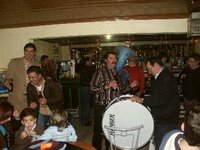 Estou eu e estaremos muitos decerto cansadíssimos da mediocridade pacóvia, provinciana, pirosa e bacoca que, de dia para dia, vai exponencialmente proliferando neste cantinho peninsular. Em quantos aspectos, áreas, sectores, domínios, «vertentes» não estamos já a anos‑luz dos «nuestros hermanos»? É demais!
Estou eu e estaremos muitos decerto cansadíssimos da mediocridade pacóvia, provinciana, pirosa e bacoca que, de dia para dia, vai exponencialmente proliferando neste cantinho peninsular. Em quantos aspectos, áreas, sectores, domínios, «vertentes» não estamos já a anos‑luz dos «nuestros hermanos»? É demais!
Se isto é uma provocação?! É claro que é! Não tenham dúvidas! Porque polemizar também é fazer cultura. Repito: polemizar.
Ainda que de uma forma intensa, ácida, chamando as coisas pelos nomes, pegando o touro pelos cornos, adjectivando e adverbializando, polemizar não ultrapassa nunca os óbvios limites cordatos que civilização e cultura definem; não cai nunca no insulto gratuito, na boca rasca ou no palavreado acintoso.
Polemizar implica forçosamente argumentar. E argumentar implica a organização lógica do discurso. E porque é por escrito, não há lugar para subentendidos, alusões ou insinuações que a comunicação presencial «aguenta» por força das expressões faciais, dos olhares, da mímica, da gestualidade em geral. E ainda porque é por escrito, não se compadece com conversa de café sobre futebol ou gajas boas. (Não estou a ver gays com um discurso desarticulado sobre gajos bons, mas pode ser desconhecimento meu, admito. Em todos os grupos sociais portugueses há grandes diferenças no tocante a educação e cultura, sejam eles maioritários ou minoritários.)
Em resumo: há que saber manter o nível, mesmo no calor mais intenso da refrega mais impiedosa. E para saber fazê‑lo é necessário não perder nunca de vista um valor primordial que, nos dias de hoje e de igual modo por todo o mundo, anda cada vez mais arredado das relações humanas, com seriíssimos prejuízos para as vidas de todos nós – o respeito. Recuso‑me a aceitar quaisquer campanhas destinadas à promoção da tolerância com a mensagem subliminar de «olhar para o lado para não insultar ou mesmo para não chegar a vias de facto». Abomino a tolerância. Exijo para mim o respeito; aquele mesmo que devo e dou aos outros. Nada mais. Promove‑se hoje a «toleranciazinha» como nos idos de sessenta se apregoava a «caridadezinha». Atitude abjecta e abominável!
E com o que é que somos confrontados a todos os níveis, sempre que se trata de uma polémica, de uma celeuma? Meras picardias de baixo nível, com todo o tipo de insultos e bengaladas à mistura, porrada verbal (quando não chega ao contacto físico), banditismo/terrorismo argumentativo, discursos ornados dos useiros e vezeiros palavrões da nossa praça, sujeitos a lógicas fortuitas e aleatórias («da batata»), sem qualquer intenção de convencer o adversário ou sequer de derrotá‑lo inteligentemente. Não, o que «triunfa» é a esperteza saloia de má memória, que prevalece sobre tudo e todos, alastrando já a níveis e a áreas onde ainda há pouco era impensável – quanto mais admissível – que tais práticas se verificassem.
Por este andar, seremos cada vez mais terceiro mundo (em termos de princípios e valores), e o nosso «primeiro mundo» será cada vez mais de fachada, fruto das mirabolantes manipulações estatísticas. Ou seja, mera retórica para bruxelense ver.
E por cá continua tudo na mesma, com os chicos espertos a arrotarem de fartura. É uma casa portuguesa com certeza…
Editado por RIC às 01:41 6 comentário(s)
Separadores:
Crítica Cultural
![]()
domingo, 27 de agosto de 2006
The Celtic Zodiac
Falling most willingly, I admit, into Minge's trap, there I was all over those pages, reading about ancient traditions of one of the least known European cultures of the past. The Celts have been around here too, so I got all the more curious.
Foretelling the future is a form of wisdom common to most peoples on Earth. The particular and sometimes peculiar way each and every people has done it tells us a lot about character, customs, behaviours, attitudes, and so on, of peoples and days gone by. So it is also a lesson in psychology and history, and I'm always eager to learn. But as far as horoscopes are concerned, I'm a hopeless rationalist as not to fall under their spell… I just cannot find a way to believe in them.
The Willow symbolizes the female and rhythms of the circle.
- Well... That first symbolism is no preference of mine. It's definitely not my cup of tea.
This tree was sacred to the Moon and, in Celtic lore, the Universe was hatched from two crimson serpent eggs (which contained the Sun and the Earth) hidden among the boughs of the Willow.
Hens' eggs were later substituted for those of the serpent and symbolically eaten as part of the Beltane feasting. This ritual was eventually transferred to the celebration of Easter in the Christian calendar with the eggs becoming Easter eggs.
– This was unknown to me. The ancient Easter tradition in the Iberian Peninsula, or at least in Portugal, has always had to do with eggs, not with hares or bunnies. Fascinating!
Always known as a «tree of enchantment», the Willow is reported to have bestowed the mystic gift of eloquence upon Orpheus when he visited the sacred grove of Persephone at the Temple of Delphi in Greece.
Physical Goal: To encourage a comfortable relationship with the material world, which is full of lessons and cycles of changing values. Change is paramount for growth… and values are no exception.
Mental Goal: To gain understanding of a particular concept… a steady accumulation of facts is the foundation of understanding. Not everything may be learned in one lesson… the key is repetition.
Spiritual Goal: To learn that there must be periods of rest rather than continual activity.
Some Famous Willow People: Charlotte Bronte, Sigmund Freud, Karl Marx, Conan O'Brien, William Shakespeare (!) and Leonardo da Vinci (!).
In general, Willow individuals are basically articulate, strong-willed, resourceful, and possessed with excellent memories.
- Oh this is all so very true... (Lol)
They touch upon all aspects of nature and its association with the Moon. Emotional and enigmatic, Willow people respond quickly to situations but are prone to sudden mood changes, which can make them difficult to get to know. Being shrewd and practical, they can be brilliant inventors but are also drawn to the unexplained mysteries of life. As a friend, the Willow individual can be a powerful ally… on the other hand, he or she can make for a formidable enemy.
- See?! Don't you ever pull my leg, or else...
Willows have a type of passive tenacity and can be extraordinarily wise counsellors and extremely nurturing parents who are protective of loved ones.
For the most part, Willows are incredibly difficult to get to know due to the type of «veil» over their personalities, which hides a great deal. Their sense of humour is not always easy to define and tends to «come and go» depending upon the occasion.
Blessed with a potential wisdom that makes them wise advisors, they are usually valued members of society. Willow individuals usually marry at a young age and close personal relationships are of the utmost importance. Since the Moon has always been associated with those who can influence the public with the force of their personality… either good or bad… the Willow individual is usually one to be reckoned with.
Willows are usually employed in very responsible positions but find it hard to settle upon a definitive career.
– Oh so damned true…
If the career choice should be in the field of education, however, they are counted among the best teachers.
– Thank you very much! Twenty years is time enough though for one to get finally convinced of his talents... (Lol)
Willow individuals seldom express a controversial opinion in public (which makes them appear very amiable) but privately, their views are usually strong one way or the other.
– Absolutely, I couldn't agree more. Just as if I were looking at myself in a mirror.
Willows must learn how to trust their inner voice or they can become moody and chronically indecisive.
– Alas, this is quite true as well…
There are two distinct types of Willow individuals (a division which relates to all Celtic Tree Signs). The «new moon» character is associated with the first two weeks of a sign and the «full moon» character is associated with the last two weeks.
The «full moon» Willow individual tends to disregard advice, even though his or her own reasoning power often lacks credibility. The «full moon» Willow is, however, the more resourceful of the two types and is blessed with an even more exceptional memory than his or her «new moon» counterpart.
- You just cannot have it all, can you?...
Born between May 1.st and May 12.th
Those born between these two dates also fall under the lesser influence of a secondary tree… the Poplar, whose motto is «Overcome Doubt» or «The Uncertainty». Poplar individuals have a decorative appearance but tend lack self-confidence. They are prone to mature very quickly and assimilate things equally as quickly.
Displaying courage only when absolutely necessary and hostile only toward extremists, the narrow-minded or hotheads, Poplar people prefer the goodwill of others and pleasant surroundings.
This individual can be somewhat choosy, is often lonely and may harbour great animosity toward others.
Artistic by nature, they are good organizers who lean toward philosophy.
Reliable in almost any given situation, Poplar people cherish their friends and surround them with love.
They take partnerships very seriously but are inclined to be generous only toward those who are generous in return.
If the Poplar perceives a warm and friendly atmosphere, then the heart and spirit opens… if not, then he or she will withdraw.
- I'm simply the best! Oh yeah...
... Even if I'm not much of a believer myself, here is another little bit of me; others will follow...
Editado por RIC às 12:01 9 comentário(s)
Separadores:
Sagezas
![]()
sábado, 26 de agosto de 2006
Aos antigos amores...
 Embora não pareça – eu sei –, a Língua Portuguesa continua a ser a rainha deste blog. Pois é… É o «mal» de quem fala várias línguas e quer servir-se de todas ao mesmo tempo para comunicar com um universo alargado de interlocutores. Mas a verdade está à vista: sempre que «sai» um texto em Inglês, Francês ou Alemão, são outros tantos em Português que ficam num qualquer limbo, donde hão‑de sair mais tarde ou mais cedo. Prometo.
Embora não pareça – eu sei –, a Língua Portuguesa continua a ser a rainha deste blog. Pois é… É o «mal» de quem fala várias línguas e quer servir-se de todas ao mesmo tempo para comunicar com um universo alargado de interlocutores. Mas a verdade está à vista: sempre que «sai» um texto em Inglês, Francês ou Alemão, são outros tantos em Português que ficam num qualquer limbo, donde hão‑de sair mais tarde ou mais cedo. Prometo.
E se eu gosto da minha língua! … Ensino‑a – e aprendo‑a – há muitos anos. E à medida que fui aprendendo outras, melhor a fui conhecendo. Sempre mais, sempre melhor. Em qualquer canto do mundo, por mais remoto, há sempre alguém que fala Português, seja com que pronúncia for. E isso é muito reconfortante.
E depois… Depois temos poetas excelentes, grandiosos. Há umas semanas trouxe aqui um belíssimo poema de Vinícius de Moraes. Foi uma pequena homenagem que quis fazer‑lhe. Hoje, enquanto ouvia o excelente álbum «Sou eu», de Simone Bittencourt de Oliveira (quero acreditar que todos a conhecem. Seria tão imperdoável como não saber quem é Amália Rodrigues ou Cármen Miranda!) ocorreu‑me, entre muitas outras coisas, escolher um tema que fosse especial para mim. Bem, tarefa difícil. Quase impossível. Todas as canções me dizem qualquer coisa «especial», por uma ou outra razão. De repente, comecei a ouvir uma que me diz muito. Mesmo muito. Quando Simone começa a cantar, parece que se inicia a projecção de um filme na minha memória: um desfile de personagens – não muitas, apenas algumas – que ao longo de uns quantos anos foram muito importantes para mim – antigos amores...
Antigos amores… Uns, perdidos para sempre, irrecuperáveis, arrumados num canto da memória e só ressuscitados por um excelente poema. Recordações com as quais me é mais ou menos fácil lidar, «apesar dos pesares»… Outros, porém, mais fortes, mais resistentes, que teimam em regressar, quantas vezes nos instantes menos oportunos, nem que seja através de uma suave memória que nem chega a doer. Mas sei que serão presenças constantes na minha vida, ao longo dos anos que me couberem viver.
É verdade. Não devemos – nem podemos – viver de recordações, mas sem elas viver faria muito pouco ou mesmo nenhum sentido, como se a nossa história pessoal fosse um eterno presente inconsequente, desgarrado de tudo e de todos.
Não, prefiro assim! De vez em quando, ao sentir um odor ou ao ouvir uma canção, que leve um valente abanão! Pois é, pode doer fundo, deixar‑me à beira de lágrimas incontroláveis, mas prefiro assim…
Com vocês quero partilhar a ideia das recordações e este fabuloso...
Onde anda você
(Ermano Silva / Vinícius de Moraes)
E por falar em saudade
Onde anda você
Onde andam os seus olhos que a gente não vê
Onde anda esse corpo
Que me deixou morto
De tanto prazer
E por falar em beleza
Onde anda a canção
Que se ouvia na noite
Dos bares de então
Onde a gente ficava
Onde a gente se amava
Em total solidão
Hoje eu saio na noite vazia
Numa boemia sem razão de ser
Na rotina dos bares
Que apesar dos pesares
Me trazem você
E por falar em paixão
Em razão de viver
Você bem que podia me aparecer
Nesses mesmos lugares
Na noite nos bares
Onde anda você?
Que bom seria! … Né?
… E sem que eu pudesse adivinhar, eis que foi grande a minha surpresa ao verificar que este magnífico poema era também do grande Vinícius de Moraes… Há coisas na vida…
(Aos poucos vou-me revelando, como quem vai tirando casquinha após casquinha a uma cebola…)
Com especial dedicatória a –
– Augusto, Carioca, Marcus e Ricardo
Editado por RIC às 00:53 14 comentário(s)
Separadores:
Músicas
![]()
sexta-feira, 25 de agosto de 2006
Fernando Pessoa: a short presentation
 A beloved friend of mine. Since a long time ago. An intimate friend for all hours. I shouldn't be writing about him. I just should leave you alone with him. He knows best how to conquer you, if you're not a friend of his already.
A beloved friend of mine. Since a long time ago. An intimate friend for all hours. I shouldn't be writing about him. I just should leave you alone with him. He knows best how to conquer you, if you're not a friend of his already.
A Poet – Fernando Pessoa – with several different voices – Álvaro de Campos, Ricardo Reis, Alberto Caeiro, Bernardo Soares…
Listen to them as if you were desperately thirsty, eager for a glass of water. He'll alleviate your frantic feeling…
The poet is a faker
Who's so good at his act.
He even fakes the pain
Of pain he feels in fact.
Fernando Pessoa (orthonym): «Autopsychography»
I'm nothing.
I'll always be nothing.
I can't want to be anything.
Apart from that, I have in me all the dreams of the world.
Álvaro de Campos (heteronym): «Tabacaria»
As long as I feel the full breeze in my hair
And see the sun shining bright on the leaves,
I will not ask for more.
What better thing could destiny give me
Than the sensual passing of life in moments
Of ignorance like this?
Ricardo Reis (heteronym): «Odes»
I have no ambitions and no desires.
To be a poet is not my ambition,
It's my way of being alone.
Editado por RIC às 02:25 2 comentário(s)
Separadores:
Poesia
![]()
quinta-feira, 24 de agosto de 2006
Le temps est mûr pour poster en Français
Il y a quelques jours, à propos du chanteur canadien Michael Bublé, quelqu'un s'excusait pour le fait que le Canada ait donné au monde une chanteuse comme Céline Dion.
J'ai répondu que je n'étais pas tout à fait d'accord car, après tout, il y a encore un nombre pas négligeable de chansons qu'elle a su autrefois chanter très bien. Peut‑être avant d'avoir commencé à faire des «expériences à la L. A.» avec ses dons vocaux, comme je crois être le cas de cette belle chanson enregistrée en 1995 dans l'album «D'eux». J'étais au Canada, moi, lorsqu'il est paru… Que de mémoires !…
La mémoire d'Abraham
Juste une prière avant d'obéir
À l'ordre des choses et de nos pères
Avant de partir
Juste une autre vie sauvée de l'oubli
Gravée bien mieux que par une lame
Dans la mémoire d'Abraham
Longue l'attente de l'heure
Lourde la peine en nos cœurs
Mais si grands notre amour notre foi en toi
Est difficile de te comprendre parfois
Que sera demain nos destins plus loin ?
Un peu de paix d'amour et de pain
Au creux de tes mains
Longue l'attente de l'heure
Lourde la peine en nos cœurs
Mais si grands notre amour notre foi en toi
Est difficile de te comprendre parfois
Conduis nos enfants pour la fin des temps
Remplis de plus de joies que de larmes
La mémoire d'Abraham.
… Et en mémoire de Marc, un ami blogger à nous tous récemment parti, je vous laisse avec cette émouvante mélodie. Écoutez‑la et pensez à lui un instant…
Editado por RIC às 14:38 10 comentário(s)
Separadores:
Músicas
![]()
Other 10 best novels of the 20.th century...
As promised, here you have other ten titles that made their way in the 20.th century novel universe. And how they did it!
As I also said once before, this is no longer a ranking; it's a list I've been establishing through the years, trying to be as inclusive of all (national) literatures as possible.
You will tell me your opinion about it. I'm sure you will...
Umberto ECO, Il Nome della Rosa (Italy)
William FAULKNER, The Sound and the Fury (United States of America)
André GIDE, Les Faux-Monnayeurs (France)
Ernest HEMINGWAY, Green Hills of Africa (United States of America)
Hermann HESSE, Das Glasperlenspiel (Switzerland)
Aldous HUXLEY, Brave New World (United Kingdom)
Milan KUNDERA, L'Insoutenable Légèreté de l'Être (France/Czech Republic)
D. H. LAWRENCE, Women in Love (United Kingdom)
Siegfried LENZ, Die Deutschstunde (Germany)
Curzio MALAPARTE, La Pelle (Italy)
… Who said I didn't care for any literature in English language, huh?
Editado por RIC às 03:10 3 comentário(s)
Separadores:
Literaturas
![]()
quarta-feira, 23 de agosto de 2006
Letters and numbers
I've never been that much into numbers.
My preferences have always been with letters – words, phrases, sentences, paragraphs, texts, articles, chapters, papers, essays, books… But the truth being no one can nowadays overlook figures, some statistical facts may turn one's head upside down. It's never easy to deal with numbers, even if one has a mathematician's brain…
For those who take life too seriously and are always quite concerned about figures, here's a blunt fact: «42.7% of all statistics are made up on the spot»…
Curious, isn't it?
If you believe the following data belong in the other 57.3%, they may appear to you as a revelation of the worst kind. And so this may well be the statistical obscenity of the 21.st century -
About 10,000 individuals worldwide have got as much money as the remainder human species, in their whole, earns by means of their work…
This is a fair world indeed…
Editado por RIC às 18:06 4 comentário(s)
Separadores:
Quotidianos
![]()
terça-feira, 22 de agosto de 2006
Sex in the animal realm
Most of us enjoy watching all those fine documentaries about wildlife so many TV channels have been producing and presenting this last decade, I'd say. Some of them are works of art indeed. True masterpieces, both visually and scientifically, no doubt about that either.
However, I've been noticing an increase of curiosity focused on animal sexual behaviour these last few years, which per se wouldn't be objectionable at all if only…
Some weeks ago (July 26.th) I posted (in Portuguese) a set of arguments for sexualities of the human species. This was brought about by a documentary I had watched called «Out in Nature: Homosexual Behaviour in the Animal Kingdom» (2001). I've always been a believer in science. Not blindly, true, but taking somehow for granted every research would rest upon an unquestionable ethical basis which accounted for its truthfulness… So much for my «faith»…
Well, I do believe now I couldn't be more mistaken. Yes, I agree: being too much naïf can some times be a clear symptom of imbecility…
That documentary bluntly showed me how wrong I was. Every scientist presenting his/her line of work had more or less been marginalized within their own scientific communities, and his/her research scorned.
In those «mainstream» documentaries I referred to above there seems to be a main purpose that is somehow conveyed as a «subliminal message»: sex in the animal realm stands for intercourse between male and female with reproductive purposes. And it has always been that way, don't you humans ever forget that! Yes, a reminder of the best kind…
Nice, huh? Of course, nothing is said or shown about bonobos, it goes without saying. And, by the way, what about becoming pregnant of each other at the same time, as it is the case of an Australian reefs' worm? The greatest achievement ever, wouldn't you say?…
Editado por RIC às 17:24 9 comentário(s)
Separadores:
Políticas
![]()
segunda-feira, 21 de agosto de 2006
Back to marvellous Greece...
Οι παίδες λαβύρινθος ανέξοδος.
Rhianus de Creta (275-195 AC)
«Boys are an endless maze.» (Translated by Sandouri Dean Bey)
«Os rapazes, labirintos sem saída.» (Trad. de RIC)
Editado por RIC às 21:30 2 comentário(s)
Separadores:
Sagezas
![]()
domingo, 20 de agosto de 2006
Gore Vidal: the man, the writer, and the fighter
1964
A review –
«Reminiscent of Robert Grave's Claudius books, Gore Vidal's imperial memoirs, Julian, is a well-researched, informative, and engaging piece of historical fiction about the nephew of the Emperor Constantine, best known for converting Rome to Christianity. Julian, more familiar with his epithet, the Apostate, tried to stem the tide of monotheism once he came to power, but his term in office was too short to effect any lasting change.
Before he came to power, the pose of an intellectual would-be cleric probably saved him from political assassination. Julian's early life was that of a prince with all that entails; including close supervision, limited access to people besides his brother, and strict regulation of behaviour. In addition to these, the ordinary shackles of royalty, the policies of Julian's cousin, the reigning emperor, Constantius, included judicious murder of anyone who threatened his supremacy.
Having first witnessed his father's murder and then his brother's, Julian had reason to be wary of his cousin. Seeking the life of a bearded philosopher, Julian hoped to escape his cousin's notice. But Constantius needed him to act as puppet head of Gaul and so Julian was dragged away from his dialogues and books, given Constantius' sister to wed, and sent away from the intellectual centres of the empire.
Julian quickly rejected the role of puppet, and since he had a military knack he soon had the command and respect of the local forces. When Constantius ordered them elsewhere, they revolted, proclaiming Julian emperor. This happened in Lutetia, a city we know so well today, and whose name was changed in Julian's lifetime to… Paris! Luck was with him when the sudden death of Constantius precluded an otherwise inevitable civil war.
Just as he took well to the position of imperial underling in Gaul, so he quickly learned to rule, before turning his attention to reviving Paganism and subduing the Christians, whom he dismissively calls Galileans. War with Persia continued giving him an opportunity to shine by flexing his military muscle, until he was felled by a weapon that, according to Gore Vidal, belonged to one of his own men.
Interjected into the memoirs are the notes of two contemporaries who show other sides of the story and interspersed in Julian's narrative are humorous bits of social commentary only superficially about the times: «In every city there is a special class whose only apparent function is to gather in public places and look at famous men... An elephant would have pleased them most, but since there was no elephant, the mysterious Prince Julian would have to do.»
Putting himself into the narrator's persona for a moment, Vidal writes: «One of the faults of most historians is that they take too much for granted. They assume that the reader must know; therefore, they tell only the uncommon things… one can see the author hovering on the verge of explaining some important fact and then shying away out of fear of dullness.»
Obviously Vidal took great care here – an excellent bibliography is given in an appendix. While enlightening, this biography of Julian is anything but dull.»
In my opinion, this is one of the best books ever written over that last, dark period of Classical Antiquity, when the Roman Empire was on the brink of collapse. Julian II, the Apostate, lived in the IV century AD – or, as some Americans (1) seem to be ready to fight for, CE, which would stand for Common Era (?!). Born in Nicomedia (not far away from nowadays Istanbul), he was killed in combat against the Persians before the massive walls of Ctesiphon, about 30 km south from nowadays Baghdad. He was only 33 years old, and after Marcus Aurelius and Hadrian he was the last emperor who was also a philosopher and a writer.
On the book itself there isn't much left to say. The review above is one of the best I've read about it. Perhaps only this will suffice to give you a better idea about the quality of a book written 42 years ago: up till now no published book either about Julian or about that period compares to Gore Vidal's Julian… Yes, a masterpiece.
About Gore Vidal… I wouldn't dare writing a word. Not only is he worldwide known for his literary œuvre, but also has he been an active American citizen his whole life through, politically committed and always ready to stand up for his ideas, even if that may have caused him some troubles now and then. What he nowadays represents for and in the gay community, chiefly as a symbol and a reminder of many fought fights, goes without saying.
(1) «The latest fuss involves letters. The staff of Kentucky's education department proposed guidelines this year that would eliminate the conventional designations of years as B.C. ("Before Christ") or A.D. ("Anno Domini," meaning "the year of the Lord"). The proposed secular substitutes to shun references to the birth of Jesus Christ were B.C.E. ("Before the Common Era") and C.E. ("Common Era").»
Richard N. Ostling, Associated Press
Editado por RIC às 13:04 1 comentário(s)
Separadores:
Literaturas
![]()
IN MEMORIAM
E il cuore quando d'un ultimo battito
avrà fatto cadere il muro d'ombra,
per condurmi, Madre, sino al Signore,
come una volta mi darai la mano.
In ginocchio, decisa,
sarai una statua davanti all'Eterno,
come già ti vedevo
quando eri ancora in vita.
Alzerai tremante le vecchie braccia,
come quando spirasti
dicendo: Mio Dio, eccomi.
E solo quando m'avrà perdonato
ti verrà desiderio di guardarmi.
Ricorderai d'avermi atteso tanto,
e avrai negli occhi un rapido sospiro.
GIUSEPPE UNGARETTI
I was about 18 when I read this poem for the first time, and my mother was lying in a hospital bed with a cancerous brain tumour. There was no possible hope in a successful operation. Six months later she would pass away.
«You are always with me, Mum. You live forever in my heart.»
Giuseppe Ungaretti: Selected Poems (Bilingual)
Editado por RIC às 11:56 3 comentário(s)
Separadores:
Poesia
![]()
sábado, 19 de agosto de 2006
Act and be merry!...

«Nunca a ninguém faltou uma boa razão para se suicidar.»
«Nobody has ever lacked a good reason to commit suicide.»
Cesare Pavese
Viver sendo até à morte.
Existir durando até estar morto.
Um é um caminho a percorrer.
O outro, uma espera adiada.
Não só no Universo
Haverá negros sorvedouros.
Como é que ledas vidas se transmudam
Em mestas durações irremediáveis?
A meditation on life being a stage: in the end we're all rather poor playwrights.
Editado por RIC às 16:52 3 comentário(s)
Separadores:
Ficções
![]()
A curious exhibition in Cologne...
Michelangelo Buonarroti
DEUTSCH
Das achte Feld – Geschlechter, Leben und Begehren in der Kunst seit 1960
Museum Ludwig, Köln
Vom 19. August bis zum 12. November 2006
Rückt der Bauer im Schachspiel auf das achte Feld, an den Rand des Spielfelds, vor, so kann ihn der Spieler gegen eine Figur seiner Wahl tauschen. Der Bauer kann sich also in eine Dame verwandeln, die machtlose Figur in eine mächtige, der Mann in eine Frau.
Sexualität erschöpft sich nicht in Familienpolitik und Fernsehserie. Sexualität ist immer auch Beben und Verwandlung, Begehren und Macht, Verführung und Trauer, Glanz und Elend.
Von Variété oder Pornographie abgesehen, lässt sich nur in der Kunst die ganze Faszination des Themas erfahren. Sie lässt nicht nur das gefahrlose Spiel mit den Geschlechtern, mit den verbotenen Wünschen zu, sie allein erfasst ihre Widersprüchlichkeit. Was bedeutet das für das abweichende Begehren? Was bedeutet es nach der Liberalisierung, in einer totnormalisierten Welt? Wie sieht diese Welt für weibliche Männer, männliche Frauen aus?
«Das achte Feld» richtet einen neuen und wachen Blick auf die Kunst, sie tastet die historischen und gesellschaftlichen Entwicklungen ab. Es ist die erste Ausstellung und der erste Katalog, wo Drag und Gender, Queerness und Transsexualität auf breitem Raum, in all ihren Facetten dargestellt werden und vor allem, wo sie erotisch sein dürfen.
Die Ausstellung präsentiert Arbeiten zahlreicher Künstler aus der ganzen Welt.
PORTUGUÊS
A Oitava Casa – Sexos, Vida e Desejo na Arte desde 1960
Museum Ludwig, Colónia
De 19 de Agosto até 12 de Novembro de 2006
Se, no jogo de xadrez, o peão avançar até à oitava casa, no limite do tabuleiro, o jogador pode então trocá‑lo por uma figura da sua escolha. Assim, o peão pode transformar‑se numa rainha, uma figura sem poder torna‑se poderosa, o homem torna‑se mulher.
A sexualidade não se esgota nas políticas familiares ou nas séries televisivas. A sexualidade é, também e sempre, tremor e transformação, desejo e poder, sedução e tristeza, esplendor e miséria.
Exceptuando o espectáculo de vaudeville ou a pornografia, só a arte nos dá a conhecer todo o fascínio do tema. Ela permite não só o inofensivo jogo com os sexos, com os desejos proibidos; só ela abarca a sua própria contraditoriedade. Que significa isto para o desejo divergente? Que significa isto depois da liberalização, num mundo padronizado até à morte? Qual o aspecto deste mundo para homens femininos, para mulheres masculinas?
«A Oitava Casa» lança um olhar novo e desperto sobre a arte, tacteia os desenvolvimentos históricos e sociais. É a primeira exposição e o primeiro catálogo, onde drag e género, queer e transexualidade são expostos em grande escala, em todas as suas facetas e, sobretudo, onde lhes é permitido ser eróticos.
A exposição apresenta trabalhos de numerosos artistas de todo o mundo.
ENGLISH
The Eighth Square – Sexes, Life and Desire in Art since 1960
Museum Ludwig, Cologne
From August 19.th until November 12.th 2006
When a pawn in a chess match reaches the eighth square on the far side of the board, the player can swap him for a piece of his or her choice. So the pawn – a lowly foot soldier – can transform into a queen, a powerless figure into the epitome of power, a man into a woman.
Sexuality does not end in family politics or a TV series. Sexuality is always a quaking and transmuting, is desire and power, seduction and sadness, splendour and misery.
Looking beyond vaudeville or pornography, only art enables the subject to be discovered in all its fascination and specificity. It not only permits a game with the sexes and with forbidden desires that is free of danger, but is alone able to grasp all of sexuality’s inherent contradictions. What does that mean for divergent desires? What does that mean after our present liberalisation, in a world standardised to death? What is this world like for feminine men, for masculine women?
«The Eighth Square» casts a new and sharp eye on art; it sounds out the historical and social developments. This is the first exhibition and the first catalogue in which drag and gender, queerness and transsexuality are presented on a broad platform, in all of its facets, and above all where it is allowed to be erotic.
The exhibition presents works by numerous artists from all over the world.
(www.museenkoeln.de/museum-ludwig)
[An meinen recht lieben Freund Hans Peter!
Es wäre sehr nett von Dir, wenn Du uns Deine Meinung über diese Ausstellung mitteilen könntest. Wir wären alle Dir unendlich dankbar…]
Editado por RIC às 03:00 2 comentário(s)
Separadores:
Artes
![]()
sexta-feira, 18 de agosto de 2006
WARNING OF A DIFFERENT KIND...
… TO THOSE IT MAY CONCERN.
I never read any emails unless they're correctly identified and/or I know in advance they're coming in.
Otherwise I just don't bother trying to figure out who the sender may be.
i) I DO NOT OPEN THEM AT ALL.
ii) I THROW THEM INTO THE GARBAGE CAN STRAIGHT AWAY.
So if you're one of those concerned by this warning move on with your life, don't waste it, and try to do something really interesting.
I cherish my friends a lot and my leisure time too much as to waste it stupidly.
Editado por RIC às 04:00 4 comentário(s)
Separadores:
Quotidianos
![]()
Poor chavs, how I pity them...
 I am in the company of someone I am lavishly fancying, and we are on the edge of… well, you know… Heads completely lost, anxious to move on to the next step, not knowing right from wrong anymore…
I am in the company of someone I am lavishly fancying, and we are on the edge of… well, you know… Heads completely lost, anxious to move on to the next step, not knowing right from wrong anymore…
Red Light!!! Stop!!!
Okay, okay! I'll go get them, there are some in the top drawer, I guess (I just can't have used them all up already, I think.).
– Oh don't bother, dear! I happened to buy some this afternoon. Aren't they cute?
Oh my God! The very minute I see that my… interest is gone. How?! I was so interested just a second ago… Under the room's shadowy light I take a closer look at the small package. Horror! It's a «Burberry»!
I wake up in distress. My bed sheets are soaked in sweat. Another f…cking nightmare. When is this sh…t ever going to end?
«The horrid omnipresence of «Burberry» tacky pattern…»
Puhlease! … Why did I have to write down this sentence in my notebook?! It just went on hammering in the back of my head. The nightmare was the outcome.
Around here you can see it almost everywhere: women and men alike wear anything displaying this pseudo‑classical combination of beige, red, white and black in a pattern which looks – it does look – rather Scottish. Maybe that's why it's so attractive, I couldn't say. I've never liked it, don't know exactly why either…
When I was about to start searching for an eloquent visual example of my viewpoint (so that I could convince my blogger friends I'm so right about this!) – Oh vision from hell below! – I came across this infamy in the shape of a… condom!
But I swear, I promise you all it was a nightmare… You don't believe me, huh? Well, I guess if I were in your shoes I wouldn't believe it either…
Can it ever be possible this belongs to the real world?! Yuk!
Editado por RIC às 02:38 6 comentário(s)
Separadores:
Crítica Cultural
![]()
quinta-feira, 17 de agosto de 2006
Crooners' week on 2: TV!

Ladies and gentlemen, with no further delay it's my great pleasure to give you...
Yes!!! Tonight was Michael Bublé's night!
What a fantabulous performance in the City of the Angels!
I had watched that very show a few months ago, so I knew what was coming… The guy's versatile, has a magnificent voice (and nice looks too), is a born performer on stage, and knows far too well how to play the strings of the heart…
Another marvellous evening in front of the TV screen! I do feel lucky…
Thank you, Canada, for all your wonderful artists!
Editado por RIC às 04:17 10 comentário(s)
Separadores:
Músicas
![]()
WARNING
I make hereby known that I shall from now on not visit any blogs displaying pop‑up windows or any other similar devices due to harmful consequences to my eyesight.
I really am so sorry.
Editado por RIC às 03:50 4 comentário(s)
Separadores:
Quotidianos
![]()
quarta-feira, 16 de agosto de 2006
Peter Cincotti... oh boy!!!
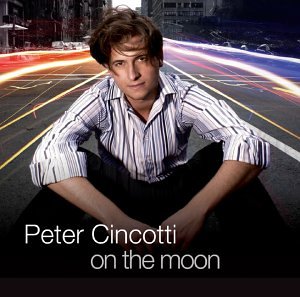
Getting ready to blog away through the night. While I still can…
All of the sudden – the TV is on – music and musicians on my favourite channel (2:), as I don't watch any other garbage, public or private. I take a quick look, and I see New York City. I begin to get interested, but I go on blogging anyway, reading Minge's comments, I guess. Then a voice – quite a voice – compels me to look again at the TV screen…
O my God!!! A rather handsome young man – some will call him a boy – is sitting at the piano and singing marvellously «I love Paris»… I love Paris too, and that song gives me goose skin… I'm mesmerized. Meanwhile the internet connection has fallen down again, but I don't even notice. I keep on gazing at the screen – okay, at the man too, absolutely – and turn the sound clearly louder, though it's a little bit late already.
The show goes on, and Peter Cincotti goes on singing beautiful songs, most of them being that kind of melodic jazz I like so much. Hmmm… Close to the end he presents a song he himself composed – like others he had sung before – and which gives the title to his latest album (photo) – I guess it's his latest: «On The Moon».
Gosh, what a delicious tune, what a fantastic voice, what a powerful expression, what a great interpretation, what a delightful face, what a bright smile!
I'm sitting back in awe, thinking to myself there are still marvellous people doing marvellous things around this world. And that comforts and consoles me…
That voice and that face are still with me, now that the show is long over. Tomorrow I guess I must spend some more extra money: I'm buying that CD, oh yes I am!!!
Editado por RIC às 04:25 10 comentário(s)
Separadores:
Músicas
![]()
terça-feira, 15 de agosto de 2006
Sexo e Cinema
Da Diastrófica Anesquintia
– Para uma crítica da escropragia contemporânea
(Tópicos de análise e reflexão)
● Pornografia ou escropragia, imoralidade, amoralidade, privacidade, intimidade, experiências colectivas, publicidade e marketing, revolução e libertação sexuais – aspectos a considerar na reflexão.
● A cinefilia mais popular de sempre – a escroprágica.
● O psiquismo feminino estaticamente dependente de um poderoso dinamismo – o mais longo orgasmo.
● Todo o homem é um sodomita em potência (v. Aristóteles); em acto, há muitos.
● Homem – pénis de aluguer do cinema escroprágico; interveniente secundarizado.
● Ideologias versus práticas, hábitos e tendências sexuais.
● Bandas sonoras – função fática de qualidade geralmente muito questionável.
● Acompanhamento sonoro clássico – enfatização da perenidade do acto sexual.
● Lugares‑comuns norte‑americanos – o início conilingual; o momento lésbico; chiadeiras, ganidelas e berrarias; a d. p. como cúmulo do desempenho; os orgasmos e os close‑ups dos copiosos espargimentos seminais.
● Caricaturas, miniaturas, trombos, varões e vergas – para uma tipologia peniana.
● A obsessão hetero‑anal – inovação criativa ou confissão de alcova?
● Aspecto físico dos protagonistas – evolução na continuidade ou ruptura por contágio com a cinefilia gay; estesias de qualidade superior.
● Gatões depredam ratinhas – nostalgia masculina do poder perdido.
● A cinefilia como voyeurismo intra muros; o exibicionismo do eu.
A ler como guião de análise, crítica e avaliação do cinema dito pornográfico.
(É requerida alguma capacidade intelectual)
Editado por RIC às 15:24 2 comentário(s)
Separadores:
Cinema
![]()
No more love

«You usually have it going on emotionally,
but roadblocks tend to land you on your butt.»
… What an accurate diagnosis!…
If I fell in love
It would be forever
Yet I weep enough tears
To fill an ocean of angst
That's all I get
For my devotion
And silence and pain
And a broken heart
All my blood spilled
I've been there enough
Often enough
Far too often
So glad I'm out
Of those iron chains
They'd fiercely bind me
And easily turn me
Into a sad pawn again
As long as I walk that path
In olympic oblivion of myself
I'll stumble and fall
Over and over again
As many times
As I disregard myself
If I look in the mirror
I'll see but a shade
I'll lose my face
Again and again
I'll crawl in shame
The rest of the way
I'll never fall in love again.
… This is a statement, not a poem... I wish I were on Rangiroa now…
Editado por RIC às 00:41 4 comentário(s)
Separadores:
Ficções
![]()
segunda-feira, 14 de agosto de 2006
Happy birthday to... ME!!!

Happy birthday to me!
Happy birthday to me!
Happy birthday, RIC blogger!
Happy birthday to me!
… No, it's not my birthday, but my bablog's one! Born to the bloggosphere on July 14.th! That's right, one month ago! And this post is – no more no less than – the 52.nd!!! Jolly great average, don't you think, dear blogger friends?
I'm not quite sure yet, but I think I can say I'm proud of the achievement. Thank you all for the encouragement you've been giving to me through your comments and, most definitely, through your own posts, always so inspiring.
A few days ago Miss Monroe would have become 80 years old. I saved that moment for now, and I want to dedicate this one of happy celebration to her – her life, her movies, her songs, her loves, her pains, her joys...
What a nice, beautiful old lady she would have turned into, I'm sure!
Happy birthday, dear Marilyn, wherever you may be!
Editado por RIC às 01:38 13 comentário(s)
Separadores:
Efemérides
![]()
domingo, 13 de agosto de 2006
A New Day's Dawning: Frederico Lourenço
 «Il ne faut pas mettre du vinaigre dans ses écrits; il faut y mettre du sel.»
«Il ne faut pas mettre du vinaigre dans ses écrits; il faut y mettre du sel.»
(One shouldn't put vinegar into his writings; one should add salt to them.
Não convém avinagrar o que se escreve; deve‑se‑lhe, outrossim, pôr sal.)
I can confidently say, no exaggeration to be feared, that the presence of this man on the Portuguese literature's stage can easily be compared with an oasis in the middle of the Sahara. Let me just say he's the only Portuguese gay writer ever.
There are other gays writing, no doubt about that, but none has come out of the closet/of his study yet, and definitely not in such grandeur as Frederico Lourenço has. No pseudonyms needed, no hidings along the writing path. With some wit, I can say «what you see/read is what you get».
I believe we Portuguese have to be thankful to an incident in his life: while his father was working on his doctoral thesis, Frederico spent part of his childhood – in Oxford. I'm sure this must account for some steps he's taken in his life course. And what steps those have been…
He's doubtlessly a forerunner as far as best quality Portuguese gay literature is concerned. His writing is in large measure autobiographical, or fictional in that sense, a most common feature in Western literature nowadays. Instead of focusing on trivia (so‑called light literature) or on sexual adventures (of erotic or pornographic kind), Frederico Lourenço has been conveying through his novels an image of «normalness» of – and a message to – a part of the Portuguese gay community ever since the 80's, which so many of us can easily identify with, and are most willing to do so.
He was born in Lisbon in 1963. In the 80's Frederico Lourenço changed the course of his life by abandoning a possible career as a pianist and embracing the studying of Classical Philology – Latin and Greek languages and literatures. In the beginning of the 90's he is an assistant teacher in the Classical Department of Lisbon University, and some years later, after concluding his doctoral thesis on Euripides's lyrical chants, he becomes a professor.
As a translator he has already done much more than many all their lives long: he's marvellously put into Portuguese the Homeric poems The Iliad and The Odyssey, published an anthology of Greek poetry, and a version for children of the Homeric poems.
To finish in beauty this «presentation» and close it with a «golden key», I make hereby public to the English speaking world that Frederico Lourenço was awarded for the first time ever the newly created «Europa - David Mourão‑Ferreira Prize» by the University of Bari, Italy, in the category of «promise», only last June. This will enable his work's translation into Italian and three other languages of the European Union (French, English and German, I presume).
Here is the list of his published novels:
Pode Um Imenso Desejo (Can an immense wish)
O Curso das Estrelas (The course of the stars)
À Beira do Mundo (On the edge of the world)
Amar não Acaba (Loving doesn't end)
A Formosa Pintura do Mundo (The fair painting of the world)
A Máquina do Arcanjo (The archangel's machine)
(These English titles are to be taken only as a «decoding» of the original ones.)
I am most proud of this post of mine today, perhaps the only one that has really made me truly happy up till now.
How I wish many more like Frederico Lourenço were among us…
Editado por RIC às 12:45 13 comentário(s)
Separadores:
Literaturas
![]()
GEOSpecial: Portugal
 For those who read German and also for those who enjoy watching beautiful, large pictures (some of them on two pages!) here is a magnificent window onto many different aspects of Portuguese nowadays daily life. It concerns not only the traditional tourist but also the curious voyager's mind.
For those who read German and also for those who enjoy watching beautiful, large pictures (some of them on two pages!) here is a magnificent window onto many different aspects of Portuguese nowadays daily life. It concerns not only the traditional tourist but also the curious voyager's mind.
You'll find all this in Nr. 4 August - September GEOSpecial issue.
Give your eyes a treat and enjoy the reading!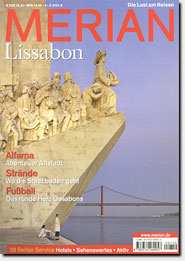 An older issue (May 2004) still available of MERIAN magazine is a delightful introduction to Lisbon habits, traditions, people, lifestyles, monuments, museums, and so on, and so forth, and brings you much closer to the most South-western European capital.
An older issue (May 2004) still available of MERIAN magazine is a delightful introduction to Lisbon habits, traditions, people, lifestyles, monuments, museums, and so on, and so forth, and brings you much closer to the most South-western European capital.
What if you happened to fall in love with it?…
Editado por RIC às 03:17 2 comentário(s)
Separadores:
Geografias
![]()
sábado, 12 de agosto de 2006
A letter from a gay son's mother...
Until I read this poignant letter I used to think – true, the reason escapes me completely though – the kind of attitude and behaviour reported would still be a major problem only in regions affected by some kind of backward mentality.
I was wrong, so plainly wrong.
Something I had never quite understood became all of the sudden quite clear in my mind: why had Marguerite Yourcenar been so fiercely secret about her lesbian relationship with her secretary?
Well, I believe I know now why…
To «Valley News», a New Hampshire & Vermont daily newspaper.
Dear Editor
Many letters have been sent to «Valley News» concerning the homosexual menace in Vermont. I am the mother of a gay son and I've taken enough from you good people. I'm tired of your foolish rhetoric about the «homosexual agenda» and your allegations that accepting homosexuality is the same thing as advocating sex with children. You are cruel and ignorant. You have been robbing me of the joys of motherhood ever since my children were tiny.
My firstborn son started suffering at the hands of the moral little thugs from your moral, upright families from the time he was in the first grade. He was physically and verbally abused from first grade straight through high school because he was perceived to be gay. He never professed to be gay or had any association with anything gay, but he had the misfortune not to walk or have gestures like the other boys. He was called «fag» incessantly, starting when he was 6.
In high school, while your children were doing what kids that age should be doing, mine laboured over a suicide note; drafting and redrafting it to be sure his family knew how much he loved them. My sobbing 17-year-old tore the heart out of me as he choked out that he just couldn't bear to continue living any longer, that he didn't want to be gay and that he couldn't face a life without dignity.
You have the audacity to talk about protecting families and children from the homosexual menace, while you yourselves tear apart families and drive children to despair. I don't know why my son is gay, but I do know that God didn't put him, and millions like him, on this Earth to give you someone to abuse. God gave you brains so that you could think, and it's about time you started doing that.
At the core of all your misguided beliefs is the belief that this could never happen to you, that there is some kind of subculture out there that people have chosen to join. The fact is that if it can happen to my family, it can happen to yours, and you won't get to choose. Whether it is genetic or whether something occurs during a critical time of foetal development, I don't know. I can only tell you with an absolute certainty that it is inborn.
If you want to tout your own morality, you'd best come up with something more substantive than your heterosexuality. You did nothing to earn it; it was given to you. If you disagree, I would be interested in hearing your story, because my own heterosexuality was a blessing I received with no effort whatsoever on my part. It is so woven into the very soul of me that nothing could ever change it. For those of you who reduce sexual orientation to a simple choice, a character issue, a bad habit or something that can be changed by a 10-step program, I'm puzzled. Are you saying that your own sexual orientation is nothing more than something you have chosen, that you could change it at will? If that's not the case, then why would you suggest that someone else can?
A popular theme in your letters is that Vermont has been infiltrated by outsiders. Both sides of my family have lived in Vermont for generations. I am heart and soul a Vermonter, so I'll thank you to stop saying that you are speaking for «true Vermonters». You invoke the memory of the brave people who have fought on the battlefield for this great country, saying that they didn't give their lives so that the «homosexual agenda» could tear down the principles they died defending. My 83-year-old father fought in some of the most horrific battles of World War II, was wounded and awarded the Purple Heart. He shakes his head in sadness at the life his grandson has had to live. He says he fought alongside homosexuals in those battles, that they did their part and bothered no one. One of his best friends in the service was gay, and he never knew it until the end, and when he did find out, it mattered not at all. That wasn't the measure of the man.
You religious folk just can't bear the thought that as my son emerges from the hell that was his childhood he might like to find a lifelong companion and have a measure of happiness. It offends your sensibilities that he should request the right to visit that companion in the hospital, to make medical decisions for him or to benefit from tax laws governing inheritance.
How dare he? You say. These outrageous requests would threaten the very existence of your family, would undermine the sanctity of marriage. You use religion to abdicate your responsibility to be thinking human beings.There are vast numbers of religious people who find your attitudes repugnant. God is not for the privileged majority, and God knows my son has committed no sin. The deep-thinking author of a letter to the April 12 «Valley News» who lectures about homosexual sin and tells us about «those of us who have been blessed with the benefits of a religious upbringing» asks: «What ever happened to the idea of striving… to be better human beings than we are?»
Indeed, sir, what ever happened to that?
… How many more young people have to go on wishing they'd be dead because they aren't allowed to live with dignity… If I now said I'm shocked I'd be no longer naïf; I'd be an utmost imbecile!
Editado por RIC às 13:42 7 comentário(s)
Separadores:
Quotidianos
![]()
sexta-feira, 11 de agosto de 2006
Dos ventos de loucura que sopram pelo mundo
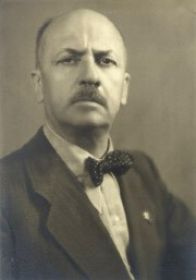
Não há mundos novos à venda em lado nenhum, apesar de tudo o que a demoníaca economia liberal de mercado livre nos impinge.
O consumismo – entranhado em nós e manifestando‑se em cada gesto nosso, do mais inconsciente e inocente ao mais criminoso e maléfico – tem‑nos levado a crer que um dia poderemos facilmente descartar‑nos deste mundo, caso ele deixe de nos servir como o tem feito até aqui: como nosso escravo.
Mas quais são os mercados que transaccionam com novos mundos?…
Tudo começou tão cedo, bem à frente dos nossos olhos. Porém, não vimos nada da sociedade de consumo em soberbo crescimento, tão cegos estávamos de querer ter tudo. Fraquezas nossas que pagaremos bem caro.
Há quase cem anos, no dealbar da modernidade, Filippo Tommaso Marinetti (foto) declarava que a guerra era «a única higiene do mundo»… Que diria ele hoje se acaso pudesse regressar de além tumba?
On the winds of madness blowing over the world
There are no new worlds for sale anywhere, in spite of everything the devilish liberal economy of free market palms upon us.
Consumerism – rooted deeply in ourselves and showing off in each and every gesture of ours, from the most unconscious and innocent to the most criminal and evil – has led us to believe that one day we may easily dispose of this world if it ever happens to stop serving us as it has been doing up till now: as our slave.
But which markets operate with new worlds?…
Everything began so early, right in front of our eyes. Yet, we saw nothing of the consumerist society in superb growth, so blind were we of wanting to have it all. Weaknesses of ours that we're bound to pay a very high price for.
Almost a hundred years ago, at dawn of modern times, Filippo Tommaso Marinetti (photo) claimed the war as being «the world's sole hygiene»… What would he say today if he ever could return from beyond the tomb?
Editado por RIC às 13:18 4 comentário(s)
Separadores:
Políticas
![]()
quinta-feira, 10 de agosto de 2006
Good readings, bad readings...

Well, Joel insisted on books!?books!?books!?… I read it all very carefully, and just couldn't resist giving my own answers to this questionnaire – non, cette fois‑ci n'est pas le proustien – that seems to be flying around the world at light speed. After translating the questions, here is the outcome:
1. One book I have read more than once – Um livro que li mais do que uma vez:
«Os Lusíadas», Luís de Camões
2. One book I would want on a desert island – Um livro que levaria para uma ilha deserta:
«À la Recherche du Temps Perdu», Marcel Proust
3. One book that made me laugh – Um livro que me fez rir:
«Dona Flor e Seus Dois Maridos», Jorge Amado
4. One book that made me cry – Um livro que me fez chorar:
«Vagabundos de Nós», Daniel Sampaio
5. One book I wish I had written – Um livro que gostaria de ter escrito:
«O Ano da Morte de Ricardo Reis», José Saramago
6. One book I wish had never been written – Um livro que gostaria que nunca tivesse sido escrito:
«Mein Kampf», Adolf Hitler
7. One book I am currently reading – Um livro que estou presentemente a ler:
«A Máquina do Arcanjo», Frederico Lourenço (photo)
[I'll soon be posting about him and his work!...]
8. One book I have been meaning to read – Um livro que há muito quero ler:
«Le Mausolée des Amants», Hervé Guibert
9. One book that changed my life – Um livro que mudou a minha vida:
«Histoire de la Sexualité» – I, II et III –, Michel Foucault
10. Languages I like to read in – Línguas em que gosto de ler:
Português, Français, Deutsch, English & Nederlands – in this very order!
Editado por RIC às 13:27 3 comentário(s)
Separadores:
Literaturas
![]()
quarta-feira, 9 de agosto de 2006
Mr. Mick Hucknall & Simply Red in Lisbon!

Less than a month now to the concert in Lisbon, at the Atlantic Arena.
Mr. Mick Hucknall & Simply Red will be singing for us on September 7.th. The day before they'll be in Oporto.
«Men and Women» is the album that captured my attention for the first time. And my liking for their wonderful music has always been growing ever since.
From «Home» here is my favourite...
You Make Me Feel Brand New
My love
I'll never find the words, my love
To tell you how I feel, my love
Mere words could not explain
Precious love
You held my life within your hands
Created everything I am
Taught me how to live again
Only you
Cared when I needed a friend
Believed in me through thick and thin
This song is for you
Filled with gratitude and love
God bless you
You make me feel brand new
For God blessed me with you
You make me feel brand new
I sing this song 'cause you
Make me feel brand new
My love
Whenever I was insecure
You built me up and made me sure
You gave my pride back to me
Precious friend
With you I'll always have a friend
You're someone whom I can depend
To walk a path that some times blends
Without you
My life has no meaning or rhyme
Like notes to a song out of time
How can I repay
You for having faith in me?
... I hereby dedicate this song to you all, my dear blogger friends!
Editado por RIC às 22:21 4 comentário(s)
Separadores:
Músicas
![]()
terça-feira, 8 de agosto de 2006
Other 10 best novels of the 20.th century
As promised some time ago, here you have other ten titles that made their way in the 20.th century novel universe. As I also said before, this is no longer a ranking; it's a list I've been establishing through the years, trying to be as inclusive of all literatures as possible. You tell me your opinion about it...
Jorge AMADO, Capitães da Areia (Brazil)
Pramoedya ANANTA TOER, The Buru Quartet (Indonesia)
Karen BLIXEN, Out of Africa (Denmark)
Jorge Luis BORGES, Aleph (Argentina)
Hermann BROCH, Die Schlafwandler (Austria)
Italo CALVINO, Cosmicomiche (Italy)
Albert CAMUS, L'Étranger (France)
Tessa DE LOO, De Tweeling (The Netherlands)
Alfred DÖBLIN, Berlin Alexanderplatz (Germany)
John DOS PASSOS, U.S.A. (United States of America)
[BREAKING NEWS - «Portuguese Culture in 100 Topics» is almost ready! I'll be posting it this week yet. It was no easy task though... My first «data base» reached nearly 250 names, but most of them get their meaning only in a Portuguese context, not in an international one. As for the adopted criteria - not easy at all to meet with... - I will most gladly brief you about them tomorrow. Of course, I'll be delighted to answer your questions!]
... And now pick a book from the shelf, sit back comfortably, and embark on a reading journey for as long and as far as you choose to. You may reach Paradise or the Seventh Heaven, you know?...
Editado por RIC às 13:47 2 comentário(s)
Separadores:
Literaturas
![]()
segunda-feira, 7 de agosto de 2006
Un tout petit badinage avec mon passé à moi...
Matemática é saber. É conhecimento. É cultura.
Quando Gottfried Wilhelm von Leibniz, considerado o último sábio universal do Ocidente, deixara já este mundo e, irremediavelmente, os saberes começavam a compartimentar‑se, é o Génio de Weimar, Johann Wolfgang von Goethe, quem nos avisa que, depois de termos esquecido tudo o que aprendemos, nos resta a cultura.
Ao rememorar aquela equação – facto em si nada relevante e pouco significativo – que entrou no meu mundo há uns decénios, faço aqui profissão de fé nas palavras de Goethe e saliento a importância da Matemática, ontem como hoje, em tudo o que concerne a vida quotidiana, do facto mais comezinho aos mais recentes progressos em todas as áreas do conhecimento.
Apesar do muito que se tem dito, não considero necessário que os meninos nas escolas tenham de «ver» a aplicação prática de tudo o que aprendem em Matemática – um imediatismo e, até certo ponto, um empirismo que pouco contribuirão para o desenvolvimento do pensamento abstracto – grave obstáculo hoje em dia ao sucesso em várias áreas curriculares. Parece que os pedagogos continuam apostados em fazer tábua rasa de tudo o que provenha dos diferentes ramos da psicologia. Atitude de avestruz? Sabia lá eu se aquela equação poderia de algum modo ser necessária ou importante para a construção de uma ponte ou para o estabelecimento de uma ligação telefónica. Era o jogo em si, com as letras e os algarismos que as substituíam, que era atraente. Era o que bastava – o desafio!
Aproveito o ensejo para lavrar o meu protesto contra todos os que teimam em considerar as «gentes de letras» como matematicamente analfabetas. Eu sei que é apenas uma equação (de «cábulas», ainda por cima, como a fórmula química do ácido sulfúrico), e não, por exemplo, uma poderosa e fascinante demonstração de um teorema… Mas, mesmo assim, não deixa de ter o seu valor simbólico e cultural. É esse sentido que prioritariamente me interessa.
Editado por RIC às 22:24 6 comentário(s)
Separadores:
Ciências
![]()
«Itsy Bitsy Spider»...
 I'm not quite sure whether I really decided it; the truth is that I've spent almost the whole Sunday going through my memories trunk. I know, sometimes it's not such a good idea… Memories are quite powerful indeed, and one can never be sure of which sleeping beasts he may be about to wake up and set free. I think I was willing to run the risk, at least at first. Well, I eventually got far too many «clouds in my coffee»…
I'm not quite sure whether I really decided it; the truth is that I've spent almost the whole Sunday going through my memories trunk. I know, sometimes it's not such a good idea… Memories are quite powerful indeed, and one can never be sure of which sleeping beasts he may be about to wake up and set free. I think I was willing to run the risk, at least at first. Well, I eventually got far too many «clouds in my coffee»…Everything started with a book I wanted to finish reading no matter what.
Heavy stuff on one hand; on the other, one of the most beautifully written, touching, poignant pieces of literary artistry I've read in recent times. By the brother (Daniel) of our previous President of the Republic (Jorge Sampaio), who is an adolescent psychiatrist, the book deals with all the imaginable experiences of a boy trying to find himself, his sexual preferences, his place among his friends and schoolmates, in his family, and his relationship with his parents, especially his mother, a kind, understanding but disappointed, overprotective woman. When he becomes 22, when his mother has finally understood what he is and that he is happy sharing his life with his first boyfriend whom she finally comes to like as another son, when she realises that her son won't ever stop loving her and cherishing that very special relationship between the two of them that had begun the minute she knew she was pregnant with him, he dies in a car accident. Both had still so much to say to each other…
«Vagabundos de Nós» («Vagabonds of Ourselves», literally) is its title.
Music has always been my best companion since… Never mind that now. As I went on reading, the chosen music began to shift back in time. First Depeche Mode, then Madonna and Pet Shop Boys (1994), Matt Bianco, and when I realised what was happening I was listening to Carly Simon (Live at Gay Head, Massachusetts, a long time ago). Yes, marvellous songs, all of them.
This is something I have to deal with quite seriously. More than anything else music has always had a strong influence on me, my moods, the way I deal with my memories, but nothing compares to the overwhelming power it has been gaining these last few years. I get too easily out of control as if it had become impossible for me to restrain my emotions. (Writing this post is getting harder and harder all the time.) What's somehow bewildering is the fact that I've never been sentimental, not even when I «should», I guess. And this is all the more disturbing as it's beginning to happen when I'm reading (at a café, as I'm used to ever since), watching a movie (in a movie theatre) or listening to a concert...
I'm really getting scared, because one thing's for sure: for as long as I live I'll always have to deal with my memories. As anyone else, for all that matters. That has never been an easy task for me, but now it's becoming disruptive of my shaky balance. Another thing's for sure: I won't become a cry‑baby without a good fight. I only hope to find all that strength I need inside myself. (And, no, I'm not crying anymore even if Carly Simon goes on singing… Enough is enough.)
… «I know nothing stays the same», but everythig's often so very difficult…
Editado por RIC às 04:15 8 comentário(s)
Separadores:
Quotidianos
![]()
domingo, 6 de agosto de 2006
«Em louvor da Língua Portuguesa»
«Floreça, fale, cante, ouça-se e viva
A Portuguesa língua! E já onde for,
Senhora vá de si, soberba e altiva.
Se tèqui esteve baixa e sem louvor,
Culpa é dos que a mal exercitaram:
Esquecimento nosso e desamor.»
(Livro I, Carta III)
Editado por RIC às 13:22 2 comentário(s)
Separadores:
Linguística
![]()
sábado, 5 de agosto de 2006
May the vile men who make wars be doomed!

A public exposure
What happened to the remains of Ctesiphon?
No matter what criminal did it, the bitter truth is that they're irremediably gone now. But only the Taliban have been proven guilty for the Bamyan Buddha's. Isn't that justice or what?...
Instead of my inflamed prose I give you facts.
«The large round city, located on the left bank of the Tigris, across the river from the Hellenistic city of Seleucia, has been identified as the great Parthian and Sasanian capital city of Tisfun, known to the Romans as Ctesiphon, the Al-Madain (the cities) of Arabic sources. Situated about 35 km south of the later city of Baghdad, in present-day Iraq, Ctesiphon was the first Sasanian foundation in this urban zone, named Veh-Ardashir, the beautiful (good) city of Ardashir, after its founder, the Sasanian king Ardashir I (AD 224-241).
Ctesiphon was the royal residence, imperial and administrative centre, and a commercial and agricultural hub of the empire in the densely populated Sasanian province of Babylonia/Asoristan. It remained the capital and coronation city of the Sasanian Empire from its foundation until its conquest by Muslim armies in AD 637.
In the second half of the 4th century (AD 363) Julian II, the Apostate, lost his life in front of its walls. Life in the city was severely disrupted when the course of the Tigris shifted and divided the city in two around the 5th century. Nearby today stands the Taq-I Kesra, or «Hall of Khusro», the principal Sasanian royal palace which the Arabs looted after their victory over the Sasanians in the 7th century.
Today the Sasanian palace is distinguished by the colossal barrel vaulted central reception hall, or ayvan, known as the Ctesiphon Arch, the largest example in the world of such an arch, built without centring. The great parabolic barrel vault is nearly 35 m high with a span of over 25 m and a length of some 50 m. The extraordinarily thick walls, designed to withstand the thrust, measure 4 m at the impost, 7 m below and 1 m at the crown of the vault.
The palace was exceptionally constructed of baked brick and originally richly embellished with marble, painted stucco panels, opulent carpets and textiles.»
From London this was to be known on New Year's Day 2006:
«In a dispatch posted Al-Madain correspondent for Mafkarat al-Islam reported on 30th December 2005, that members of the Badr Brigades and more than 11 Islamic Regime Revolutionary Guards from Iran together with a large armed force with a number of vehicles caused serious damages what had remained of the ancient Iranian «Palace of Khosrow», Ctesiphon, and the buildings near by.
The correspondent for Mafkarat al-Islam reported a source in the Antiquities Department in Al-Madain, Khalid Abd Ayyash who went to the scene as saying that the Badr gunmen accompanied by the revolutionary guards went into the great monument and stayed there for more than three hours, wrecking and damaging what had remained standing of the ancient ruins.
Ayyash said that after the Badr Brigade and revolutionary guards left, he found that they had torn up the palace of Khosrow by the foundation. Four columns had also been wrecked as was a small arch that encircled the outer gates of the palace. They gave no reason for their act of wanton destruction.
The correspondent reported that the same site had also been attacked when the United States forces stormed into the city earlier this year. At that time more than 50% of the ruins were razed.»
SIC TRANSIT GLORIA MUNDI…
Editado por RIC às 15:40 1 comentário(s)
Separadores:
Políticas
![]()
Another Portuguese failure...
DEPECHE MODE CONCERT IN LISBON CANCELLED
CANCELLED
«The Depeche Mode concert scheduled for Lisbon's Alvalade Stadium on July 28 is cancelled, due to the serious financial difficulties of the promoter José Araújo's company «Brand New Day». Unfortunately this promoter failure makes it impossible for Depeche Mode to perform this Lisbon concert.
The Band apologizes to disappointed fans.»
Unfortunately another one… Surely not the last… I had no ticket myself (I don't enjoy stadium concerts), but some friends did. They were so disappointed… Well, all I can do is try and cheer them up a bit. As a small treat here is the…
World in My Eyes
Let me take you on a trip
Around the world and back
And you won't have to move
You just sit still
Now let your mind do the walking
And let my body do the talking
Let me show you the world in my eyes
I'll take you to the highest mountain
To the depths of the deepest sea
And we won't need a map, believe me
Now let my body do the moving
And let my hands do the soothing
Let me show you the world in my eyes
That's all there is
Nothing more than you can feel now
That's all there is
Let me put you on a ship
On a long, long trip
Your lips close to my lips
All the islands in the ocean
All the heaven's in the motion
Let me show you the world in my eyes
That's all there is
Nothing more than you can touch now
That's all there is
Let me show you the world in my eyes.
Editado por RIC às 13:19 2 comentário(s)
Separadores:
Músicas
![]()
sexta-feira, 4 de agosto de 2006
O pequenininho mundo interior dos Portugueses
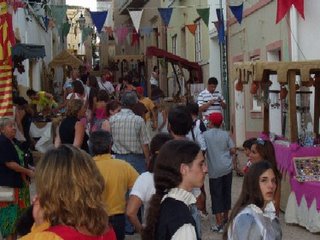
Se os Portugueses terão sido sempre brandos, hoje sê-lo-ão porventura mais do que nunca. Bastará lançar um furtivo olhar aos nossos vizinhos para perceber em que atoleiro nos temos vindo a afundar. Que fazer quando, enterrados os sonhos de um tempo que se afigurou promissor, se olha em volta e quase tudo parece decorrer de uma insaciável vontade de dinheiro fácil, de uma inaudita ganância?
Que caminhos trilhar na busca da construção de uma capacidade colectiva de reflexão que nos liberte, enfim, deste nosso estado de menoridade? (Ia acrescentar o adjectivo «intelectual», mas obviamente não é possível.) É certo que sempre nos levaram a não pensar. Se somos pouco ou nada reflexivos, muito pouco ou nada propensos ao pensamento sistemático, excepções há – e das melhores – que nos devem inspirar. Nomes? António Sérgio, Leonardo Coimbra, Agostinho da Silva, Fernando Gil, Eduardo Lourenço… Mas, lá está, para saber o que pensaram e como pensaram, é preciso ler.
Planos nacionais de incentivo à leitura? Ah, mas sem dúvida, com certeza! Desde que, nas escolas, os alunos acreditem que ler é também o que toda a gente faz. Adultos inclusive, naturalmente. Mas como tal não é, de todo, o caso, em quem poderão eles acreditar? E aqui entramos nos terrenos movediços dos facilitismos incentivados por muitos morangos com açúcar, muitos diários desta e daquela, muitas floribelas e quejandas calamidades verdadeiramente obscenas e pornográficas, decididamente apostadas em manter o statu quo. (Para esclarecimento do significado de pornografia, queira consultar um dicionário etimológico.) Ou haverá ainda alguma boa alma ingénua, crente de que sejam as ditas audiências a determinar as programações televisivas?
Haverá algum grupo de cidadãos apostados em lutar contra estes despautérios, que mais não seja para defesa da sanidade mental dos filhos? Não. Por aqui se vê que não somos dados a iniciativas que, noutras paragens, movimentam cidadãos activos que não se curvam aos desígnios, quase sempre camuflados, de um poder político transformado em testa de ferro de poderios económicos, graças aos desmandos de um ultraliberalismo que, sempre por dinheiro, trucida seres humanos sem dó nem piedade. E enquanto disto não tomarmos todos nós consciência plena e não nos opusermos decididos a este estado de coisas, misérias maiores cairão sobre nós, dia após dia, até tudo rebentar pelas insustentáveis costuras.
Editado por RIC às 10:31 0 comentário(s)
Separadores:
Crítica Cultural
![]()










